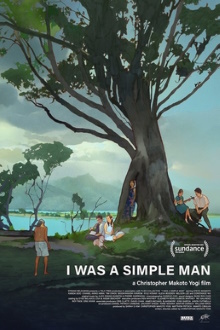I think this counts as an Asian-American film as not a single white person appears in it. More than that, it stands out as a distinctively Hawaiian film by a director, Christopher Makoto Yogi, who I haven’t heard of before this, but seems to ground almost all of his work in that state. This kind of close, personal association is always a good sign in my book. This film didn’t always work for me as it sometimes reaches for the sublime and doesn’t quite touch it. Still, it’s a very fine film that contemplates a man’s death after a long life.
Japanese-American Masao Matsuyoshi lives alone in a house far from the city with only his dog for company. He is old and dying. He has children and grandchildren who live in the city or on the mainland but none are close to him as he sent them away to grow up with other relatives when his wife Grace died decades ago. They still dutifully visit for special occasions and when Masao finally becomes bedridden, his daughter and a grandson reluctantly take turns to come and take care of him. As his health deteriorates, Grace’s ghost seemingly manifests from the tree at whose base her ashes were scattered. Masao alone seems to be able to see her and he welcomes her presence. The past and the present become interweaved together as younger versions of both Grace and Masao himself relive past conversations. Through these visions we learn something about their lives with Masao being born of Japanese immigrants before the Second World War and Grace being of Chinese ethnicity.
The premise here sounded wonderful to me: a contemplation of imminent death after a long life from the perspective of Asians who make Hawaii their home. This calls for expansive vistas of the islands, of both its lush forested state in the past and the built-over present; scenes of Hawaiian society before it was fully integrated into the US and plenty of dream-like sequences where time, space and perhaps even reality are malleable. There is little dialogue and Masao is stubbornly taciturn even when others directly ask after his health. The style makes me recall the work of Apichatpong Weerasethakul though this film is far more approachable and less obtuse. Such spiritual films are usually full of quiet spaces and moments, into which sublimity is then infused. Although ambitious, Yogi is as yet not quite that masterful a director. Some of the emptiness in here is backfilled in later with past episodes from Masao’s life. Others are simply left empty as we end up learning little of how he lived after Grace died. The musical cues in this film are particularly clumsy with unsubtle prompts where no music at all would serve better and even a horror movie-style suspense building track when there are hints of the supernatural.
The style works decently at capturing some of the universal truths of death: how it’s simultaneously so complex and yet so simple, how it wears down on family members, how it’s a time of judgment for a lifetime’s worth of decisions and choices. Watching Masao die in the house that he clearly loves and how his commitment to Grace remains undiminished by the passage of time even when he doesn’t speak of it is also affecting. I do appreciate this glimpse into the lives of Japanese-Americans and how Masao broke off with that side of his family, yet this is still no more than a glimpse when such a story could easily fill an entire film all on its own. But on the subject of death itself, Yogi doesn’t seem to be able to offer any particular or unique insights that we haven’t seen elsewhere.
On the whole I think I like the premise and the intentions behind the film more than the film itself. You can see what Yogi is trying for and what he manages to create isn’t bad. On the other hand, it’s not great either and when you’re consciously trying to evoke the same kind of sublimity as the world-renowned great directors, not being able to quite reach that pinnacle feels especially awkward.
